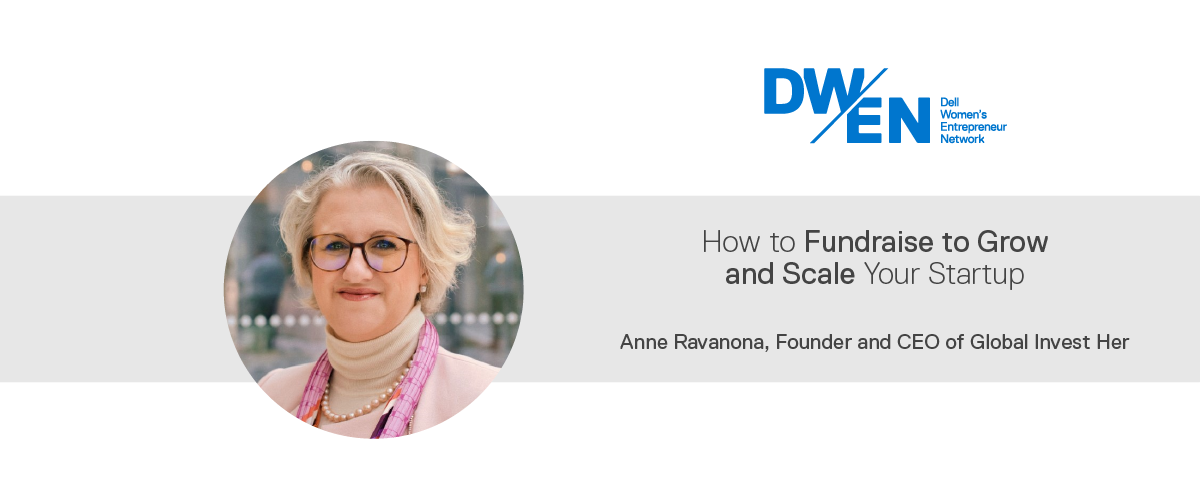
Esta minissérie ajudará você a entender como suas necessidades e fontes de financiamento podem mudar em diferentes estágios de sua jornada à medida que você constrói e expande sua empresa. Nosso especialista em financiamento Anne Ravanona, fundadora e CEO da Global Invest Her, compartilha uma variedade de opções de financiamento, práticas recomendadas e dicas importantes para ajudá-lo a navegar em sua jornada de financiamento em cada um desses três estágios principais – como solopreneur, como solopreneur desenvolvendo uma equipe e como uma startup pronta para crescer ou escalar.
How to Fundraise to Grow and Scale Your Startup
(Part 3 of a 3-part series)
Building on our previous blogposts Como arrecadar dinheiro para sua startup como solopreneur em estágio inicial e a How to Raise Money for Your Startup as a Solo Founder with a Team, let’s continue your journey in the world of raising funding, where you are now raising money to grow and scale your company.
Como é esse estágio, em geral?
Raising funding to grow and scale your company usually happens once you have found product-market fit and you need to expand your reach, enter new markets or scale your operations. The funding you have raised and used up until now will typically have been to help you reach product market fit, where you now know exactly the customers you are serving and the market share you want, have successfully tested and adjusted your product/service to meet their specific needs and you know this because your revenue is growing at a fast pace. You will have already successfully raised first round(s) of funding, know how to engage with and manage your first investors and have increased the valuation of your company.
Great!
Looking for funding at growth/scale stage is very different from earlier stages because the stakes and expectations of investors are higher, you need to raise more money to fuel growth and will be dealing with more sophisticated funders/investors. Before we dive into more detail, understanding the difference between Growth vs. Scaling is crucial. Growth is usually steady and proportional (although it can be fast), while scaling is exponential and can be more ambitious. Which one you choose in future is a reflection of your medium and long-term vision for the business, what you believe it can achieve and the type of business you want to be.
Quais são as realidades e desafios nesta fase? Qual é a sensação?
 You may have several product/service lines, be in more than one geographical territory and are now looking to expand and capture more market share.
Being the leader of your company in growth or scaling stage requires a whole different mindset and skillset and sometimes, you or even your board can decide to bring in an external CEO to manage this specific phase, while you focus on core areas such as Product Development, Innovation or Business Development. This isn’t always the case, though it is prudent to be aware of this, as investors want to get the most out of this stage to maximize their return on investment and look towards a potential exit (company sale or IPO).
At this stage, you’ll need to step up your executive mindset and presence, manage your priorities, focus and energy differently, to best navigate more sophisticated investors, partners, clients and team members. You’ll need to think long-term, cultivate a nurturing culture, and inspire those around you, while ensuring strategy, creativity and innovation continue to be the driving forces.
You may have several product/service lines, be in more than one geographical territory and are now looking to expand and capture more market share.
Being the leader of your company in growth or scaling stage requires a whole different mindset and skillset and sometimes, you or even your board can decide to bring in an external CEO to manage this specific phase, while you focus on core areas such as Product Development, Innovation or Business Development. This isn’t always the case, though it is prudent to be aware of this, as investors want to get the most out of this stage to maximize their return on investment and look towards a potential exit (company sale or IPO).
At this stage, you’ll need to step up your executive mindset and presence, manage your priorities, focus and energy differently, to best navigate more sophisticated investors, partners, clients and team members. You’ll need to think long-term, cultivate a nurturing culture, and inspire those around you, while ensuring strategy, creativity and innovation continue to be the driving forces. What you should know about raising funding at this stage?
Raising funding to scale and grow has a different flavor, focus and pace to it. The amount of capital you will be looking for will be a lot higher, due to higher valuations and the need for significant resources to scale. The use of funds you raise will focus on expanding production, scaling operations, marketing and sales efforts and even international expansion (vs product development, market research, recruitment and market entry strategies at an earlier stage).
Algumas dicas gerais importantes nesta fase:
- Investors/Funders will expect a clear path to profitability, lower risk and often look for shorter-term exits through acquisition or IPO. Make sure you consult other founders who have closed Series A + rounds to get their valuable insights to help you choose and close the right growth level investors.
- Valuation is usually higher, as you now have tangible metrics such as revenue, market share and growth rate (vs projections at earlier stages). On the plus side, you may face less dilution compared to earlier rounds, due to the higher valuation.
- Your pitch and documentation need to be data-driven, with a focus on real financials, growth metrics, market traction and a clear strategy for scaling (vs more focused on vision at an earlier stage).
- Due diligence will be more thorough at this stage, including financial audits, market analysis, evaluation of existing operations and customer base.
- Keep existing customers happy – make sure you provide the high-quality products and services they are used to and keep them up to date about new features/products coming, so they know what to expect in future.
- Remember to stay flexible and adaptable – with high growth and scale will come your fair share of bumps in the road and surprises, so make sure to pivot if necessary (remember Covid?) and admit when you need to course-correct.
- Don’t hire too fast – often in the growth stage, companies hire fast and find themselves having to let go of good people later on, burning funding faster or renting shiny new offices they don’t need. Steady wins the race each time.
- Seek specific legal and financial advice – make sure you consult with experienced legal and financial experts who are used to funding for scale and growth, to ensure you negotiate the best terms. This is definitely the time to invest in these types of services, and are understood by investors to be a normal business cost (especially as they are so high for these types of transactions).
Quais fontes de financiamento os fundadores normalmente usam nesta fase?
At growth and scale up stage, the sources of funding and sophistication of the funders and level of negotiation change too, so you need to make sure you are ready for each. Here are some of the key sources of funding used by growth startups and scale ups:
Non-dilutive sources of funding (where you don’t give up any equity):
Grants at growth and scale stage, you may be eligible for major innovation, R&D or export focused grants provided at country or international level (eg in Europe, see EIC funding from the European Commission grow and scale); These types of grants tend to be highly competitive, with a lengthy application and due diligence process. The huge positive is that the money is non-dilutive, and investing the time and energy in submitting an excellent grant proposal (or hiring a grant expert with experience in those types of proposals for specific grants) are worth it. These types of grants also tend to be very prestigious and show the level of de-risking you have done, which can positively impact your valuation and attract more high-caliber later stage funders.
Loans: At growth stage, you will be looking at bigger size term loans, bridge loans, equipment financing, lines of credit and some SBA / Growth loans from your country bank, to help you manage liquidity and fund part of your growth stage. On the plus side, you will have a clear repayment plan (good for financing and budgeting) and you may get more favorable interest rates. Look for women focused loan programs, and SBA backed loans.
Strategic Partnerships: these can be a highly effective way for a you to grow or scale. They are usually mutually beneficial and go beyond mere financial transactions. You can come together with another business to share resources, knowledge and strengths to achieve common objectives and can range from joint ventures, co-marketing agreements to supply chain partnerships. The goals can include expanding into new markets, enhancing product offerings, sharing technological resources, or leveraging each other’s customer base and distribution networks. Eg partnering with a corporate to test your product in a new geographical territory or segment. Sharing resources can lead to reduced costs and increased operational efficiency and are a clear sign of traction, strategy and solidity, to external investors.
Customer revenue: At growth/scale up stage, you should be seeing significant, consistent monthly growth in revenue and very significant annual growth and profit/user rate.
Dilutive sources of funding:
Equity Crowdfunding: equity crowdfunding campaigns can be a good way to raise funding in the growth stage, especially if you have already raised money on that platform before and have a track record there. They still require attention and usually by this time, you’ll have a marketing team to manage a lot of the ground work, allowing you to be there for strategic investor meetings and presentations.
Angel Investors / Super Angels / Syndicates: At later growth and scale stage you may consider raising another round from your existing angels, or even bring in a super angel (who can write the $250K+ checks) to fill out your round. You may also buy out some earlier stage angels who can’t re-invest this round and keep that equity to propose to growth vcs and other funders.
Growth VCs (venture capitalists): Growth and scale stage is the preferred playground for many VC firms to play in. You will have by now built relationships with some VCs, either from first raises with earlier stage vcs or on-going conversations with growth stage vcs in view of raising your Series A+. Make sure the VCs you target are the right stage, geography and are still deploying capital from their fund. This is where leveraging your network (of investors, partners, founders) will come in, to help you identify the right VCs to accompany you on this next stage of growth. Remember they will want detailed financials and growth metrics as well as access to clients to do more detailed due diligence. Get good legal and financial advice to negotiate your term sheet and valuation.
Family Offices: A family office is a private wealth management advisory firm that serves ultra-high-net-worth individuals. It is set up to manage a family’s private wealth, handle investments, and provide other financial services, such as estate planning, tax services, and philanthropy management. Family offices are distinct in that they offer personalized services tailored to the specific needs of the family they represent and some invest in scale ups. Unlike venture capitalists, family offices often have a longer-term investment horizon. This aligns well with businesses that need patient capital to grow and scale without the pressure of quick returns. Family offices may often invest in companies that align with personal values or interests. Women founders with businesses focusing on social impact, sustainability or innovation can often find a good fit here. They can often operate more discreetly, which can be beneficial to companies who want to grow without much public attention.
Private Equity Firms: A private equity firm is an investment management company that provides financial backing and makes investments in the private equity of startup or operating companies through a variety of loosely affiliated investment strategies, including leveraged buyouts, venture capital, and growth capital. These firms raise funds from institutional and individual investors and then use these funds, along with borrowed money, to invest in businesses they believe have high growth potential. They often can write very large checks (in multi-millions) and bring a wealth of experience and proven strategies in scaling businesses. They can also give access to vast networks of industry experts, potential customers or future funding sources.
At this growth/scale stage, the key is to find the right partners whose investment thesis, expectations, approach and values match the goals and needs of your business. Choose them wisely and you will go far. Remember to ask your network for introductions.
Principais recursos do Funding Hub que podem ajudá-lo nesta fase:
- Funding Series Part 4 – What Investors Want
- DWEN EntreprenHERS Meetup em Mumbai: criando o argumento de venda perfeito para despertar o interesse de VCs
- O que os investidores querem saber antes de investir
- Funder Directory from Global Invest Her a global directory of women founder friendly sources of funding, to help you do your funder research and find the right funder faster.
Other DWEN resources about Scaling:
- Are you Ready to Level Up ?
- New Methods of Scaling Your Business
- Member Voices: A Bootstrapper’s Guide to Scaling Without Venture Capital
- Como agilizar sua startup conforme você escala
- Member Voices: Strategies to Scale and Build Resilience with Dee Claxton
- Mentorship Program: Advice to Get Growing
Thank you for reading this 3 part series. We hope you found these articles helpful and feel free to share them with your network. Best of luck with your fundraise and be sure to keep us posted in DWEN about how it goes, and share your journey, so other members can learn from you.
Access Part 1: How to Raise Money for Your Startup As an Early-Stage Solopreneur)
Access Part 2: How to Raise Money for Your Startup as a Solo Founder with a Team
Sobre Anne Ravanona & Global Invest Her
Anne Ravana, fundador e CEO da Global Invista Ela, e nosso parceiro e autoridade do setor em nosso Centro de Financiamento DWEN, tem a missão de conseguir financiamento para um milhão de mulheres empreendedoras até 2030. Ela é uma defensora apaixonada das mulheres e uma autoridade reconhecida no financiamento de mulheres empreendedoras. Através do seu trabalho na Global Invest e da sua liderança como delegada da UE no G20 e no seu grupo de trabalho Women20 (W20), Anne trabalha incansavelmente para mudar o jogo do financiamento, ajudando as mulheres empresárias a obter financiamento mais rapidamente.

